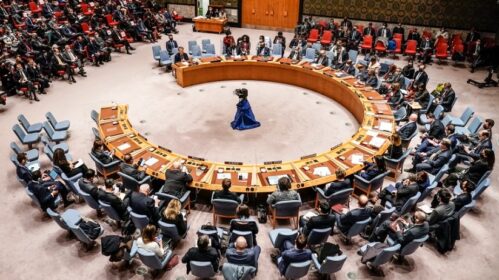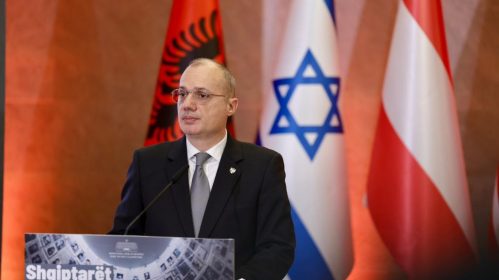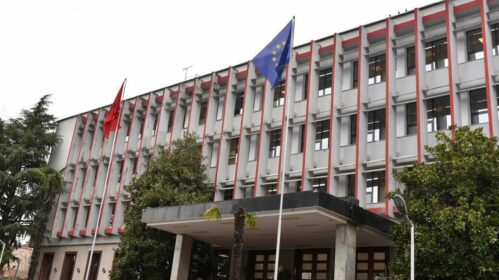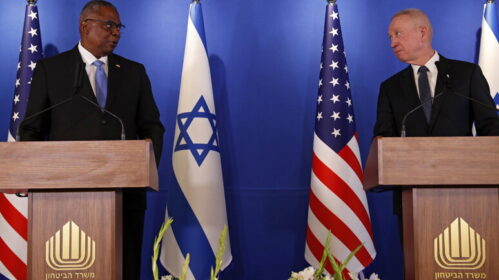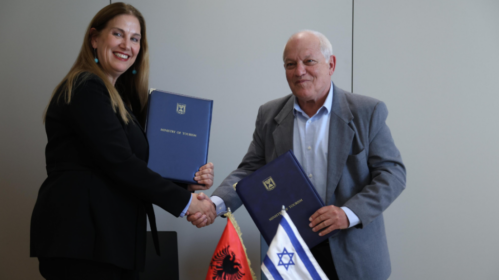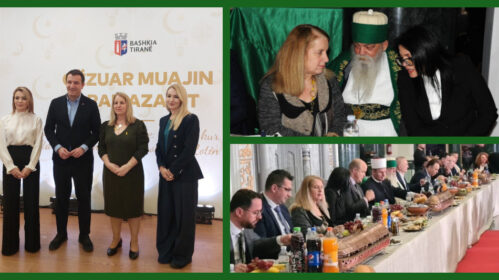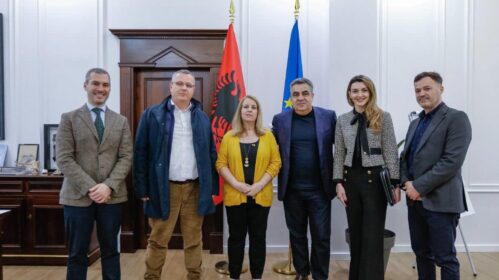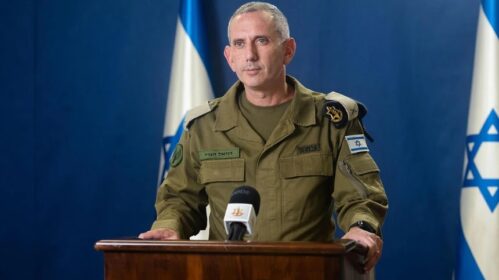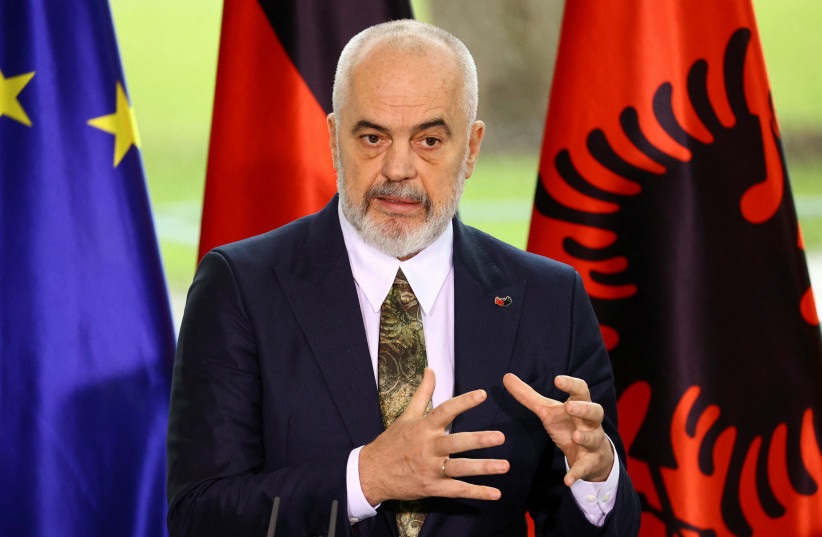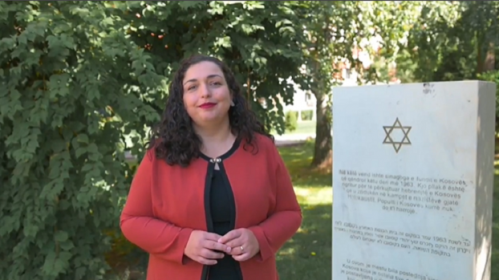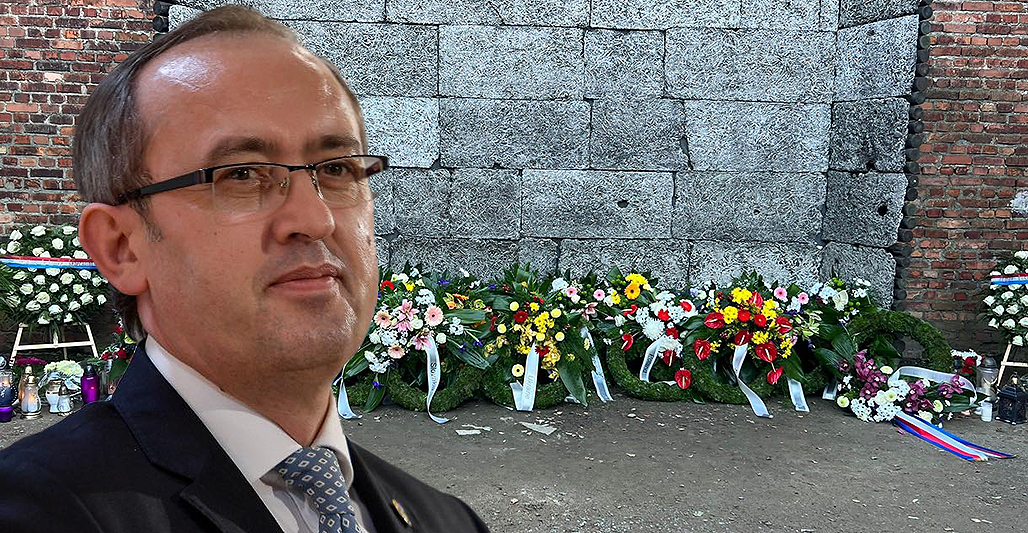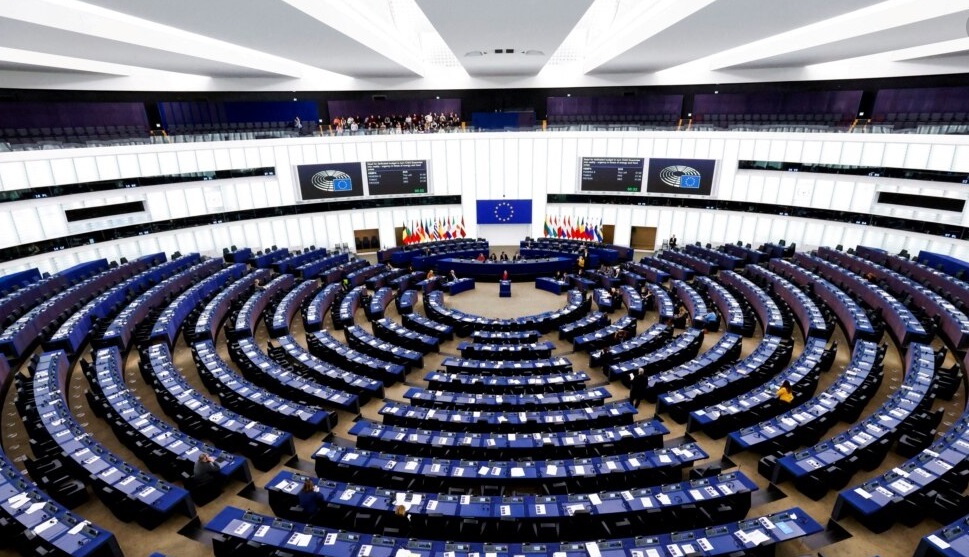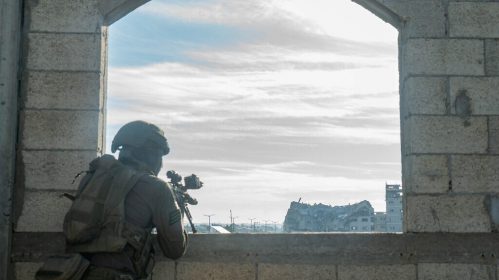It was the autumn of 1993, just weeks after the Oslo Accords were signed. The conciliation in the Middle East was on everyone’s lips, from Northern Ireland to the Basque Region and the Balkans. Shimon Peres, the indefatigable foreign minister, was basking in international fame and acclaim.
In late November, his plane was about to land at the airport in the Albanian capital of Tirana, for the first Israeli visit to this remote Muslim corner of Europe. The place was desolate. Thistles grew out of the cracks in the old runway. The lights of the approaching aircraft were already visible through the gray morning clouds.
Suddenly, from a nearby field, there came sounds of barking and yapping – a pack of dogs heads for the center of the runway. The official greeters and journalists hold their collective breath, police officers spring into action, jumping onto their Jeep and racing off to scatter the dogs. The plane can now land.
Peres himself strolls out. His glance takes in the round bunkers that are scattered around in suspicious profusion. “This is the land of a million bunkers,” Peres said, coining one of his characteristic epigrams. “There are more bunkers here than telephones.”
These bunkers, a symbol of the Communist rule, were built on the orders of Enver Hoxha as part of the constant siege atmosphere that his terror-based regime cultivated. They are now covered with sand and weeds, and in a few years they will disappear. “Only archaeologists who will come here in a few thousand years will ask what kind of strange state this was,” says a local official.
Ten years have passed since the collapse of the old regime, and Albania is swiftly shedding its bunker mentality. It is still one of the poorest countries in Europe, but the signs of change are evident everywhere. Against the backdrop of the traumas faced by the Balkans in the last decade, Albania seems to be going in the right direction.
It would be an exaggeration to describe it as an island of stability, but the country’s leaders are evincing prudence and contributing to the international effort to untie the Gordian knot that is the region, with its many Albanian communities.
European diplomats agree that that difficult problems in Kosovo and Macedonia could be exponentially more painful were the Albanian government to lend a hand to the forces of subversion and agitation in the region.
“A `Greater Albania’ vision is pure fantasy,” explains Bashkin Dino. “Albania doesn’t want it and isn’t involved in it; it’s just a fantasy.” Dino has been assigned to the Albanian embassy in Tel Aviv, in an apartment on Pinkas Street, for a year now. His staff consists of a single diplomat. Israel does not have an embassy in Tirana.
The new ambassador in Rome, Ehud Gol, was appointed non-resident ambassador to Albania as well. It takes a well-developed imagination to presume that stationed at this modest embassy is a leading expert in Balkan affairs. The simplicity of manner of the Albanian ambassador to Israel can be deceptive. Bashkin Dino is one of the most experienced and knowledgeable diplomats in his country’s foreign service.
He served as ambassador in Scandinavia, Greece and Italy; he headed up the diplomatic section of the Foreign Ministry; he was diplomatic adviser to the prime minister, and he came to Israel as far back as 1991 to establish diplomatic relations. He knows the situation in the Balkans from close range – for years he has been forging the path of his small country through the maze of one of the most difficult neighborhoods in the world.
Last week Ambassador Dino was particularly tense. Two and a half years after the war in Kosovo, UN-sponsored elections were held in this fractured region. The polling results, which will lead to the establishment of an elected self-government, give Kosovo a status that is unique and unclear in terms of international law. The area, which has Albanian majority of over 90 percent, was – and in practice still is – an autonomous district within Serbia, which itself is part of the Yugoslav Republic. As a result of international intervention, Belgrade lost all control over the province, which is under the direct protection and management of the United Nations.
De facto, Kosovo is in effect an international protectorate. The connection to Yugoslavia is a fiction maintained under a promise made by the factions that entered the war – chiefly, the United States – not to bring about the establishment of an independent Albanian Kosovo.
The region has its own currency, supreme court, defined borders and identity documents for its inhabitants. A government is about to be established, with a parliament, prime minister and president. The latter will be Ibrahim Rugova, of course. Kosovo is marching toward a distinct independent status, but critical spheres of sovereignty will remain with the UN – policing, security and foreign policy. It is no wonder that immediately following his election victory Rugova, leader of the Democratic League, made an emotional appeal to the international community to recognize the area as an independent state.
But the West wants to keep Kosovo’s permanent status fuzzy. The reasons are complex – an independent Kosovo could initiate steps toward unification with Albania and change the geopolitical balance in the Balkans. The West is still hoping to effect the return to Kosovo of the 180,000 or so Serbs who fled after the war. Ending the association with Yugoslavia would interfere with that. Independence in Kosovo could also pique the interest of Albanians in Macedonia and disrupt the fragile peace process there.
Bashkin Dino in any event is very satisfied. “The elections in Kosovo took place in an exemplary manner and are an excellent basis for the Albanians in Kosovo to establish democratic institutions and lead it into integration with Europe.”
And what about the “Albanian integration” – independence first and then, perhaps, unification with Albania?
“We, as Albanians, will support any decision that they take, but Albania does not interfere in internal affairs there. I have to say, and we have international corroboration of this, that the Albanian government is working toward peace, dialogue and stability in the Balkans. It is in our express interest because we envision the future of the entire region in an integration into the large European structure.”
Dino refuses to comment on the issue of independence for Kosovo. “It depends on the Albanians there. They are the ones who will decide their future, and we respect the UN resolutions on this subject.”
And still, like every Albanian, the ambassador finds it hard to ignore what happened in Kosovo in recent years. He completely understands the opposition of the Albanians in Kosovo to ties with Serbia. About the ouster of Slobodan Milosevic from the Belgrade leadership he has only words of praise. “Great joy” is how he describes his feelings when he heard about the former Yugoslav president’s extradition to the International Court of Justice in the Hague.
“It’s not a matter of personal opinion, but there really is no future for Kosovo under Serbia. The Serbs carried out genocide there, there was an exodus of refugees – more than half a million of them came to Albania. A few hundred even came to Israel, and we thank you for that from the bottom of our heart. In any event, with regard to Kosovo, now we publicly declared that we do not support the annexation of Kosovo to Albania. True, there is historical baggage, there are nationalist sentiments, they are our brothers, it’s the same blood. But we are interested in the current situation.
Rogova seeks independence, the international community is opposed and for our part we can say we will support any decision taken there, and meanwhile we are very happy that the elections were held in a completely democratic fashion. The Serb minority took part in them and our hope is that they will find a way to integrate Kosovo into Europe.”
Albania demonstrates this measured approach, which has won international praise, over the hornets’ nest of Macedonia as well. “The Albanian fighters there laid down their arms, which shows that they are in favor of diplomatic dialogue and want to end the conflict through political means,” Dino says. “The Albanian government always argued – and we have corroboration for this too, that Macedonia is a sovereign state and must remain so. We didn’t support the Macedonian Albanians who launched an armed struggle. We wanted them to respect Macedonia’s sovereignty, to lay down their arms and conduct negotiations, and we are very happy that this has happened.”
However, and here the Albanian diplomat adds a very significant “but,” the Albanians there “must be respected and not treated like second-class citizens. They are Macedonian citizens and must be partners in the building of a democratic Macedonia.”
https://www.haaretz.com/1.5467466





